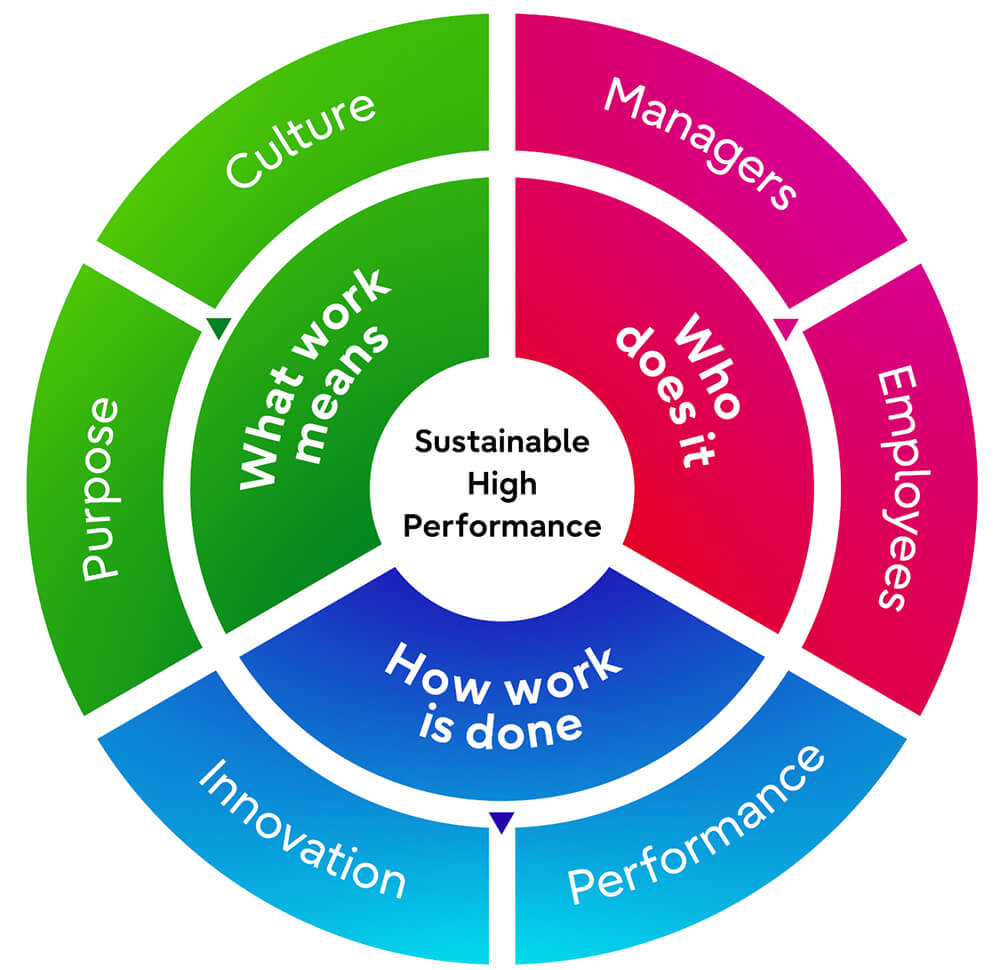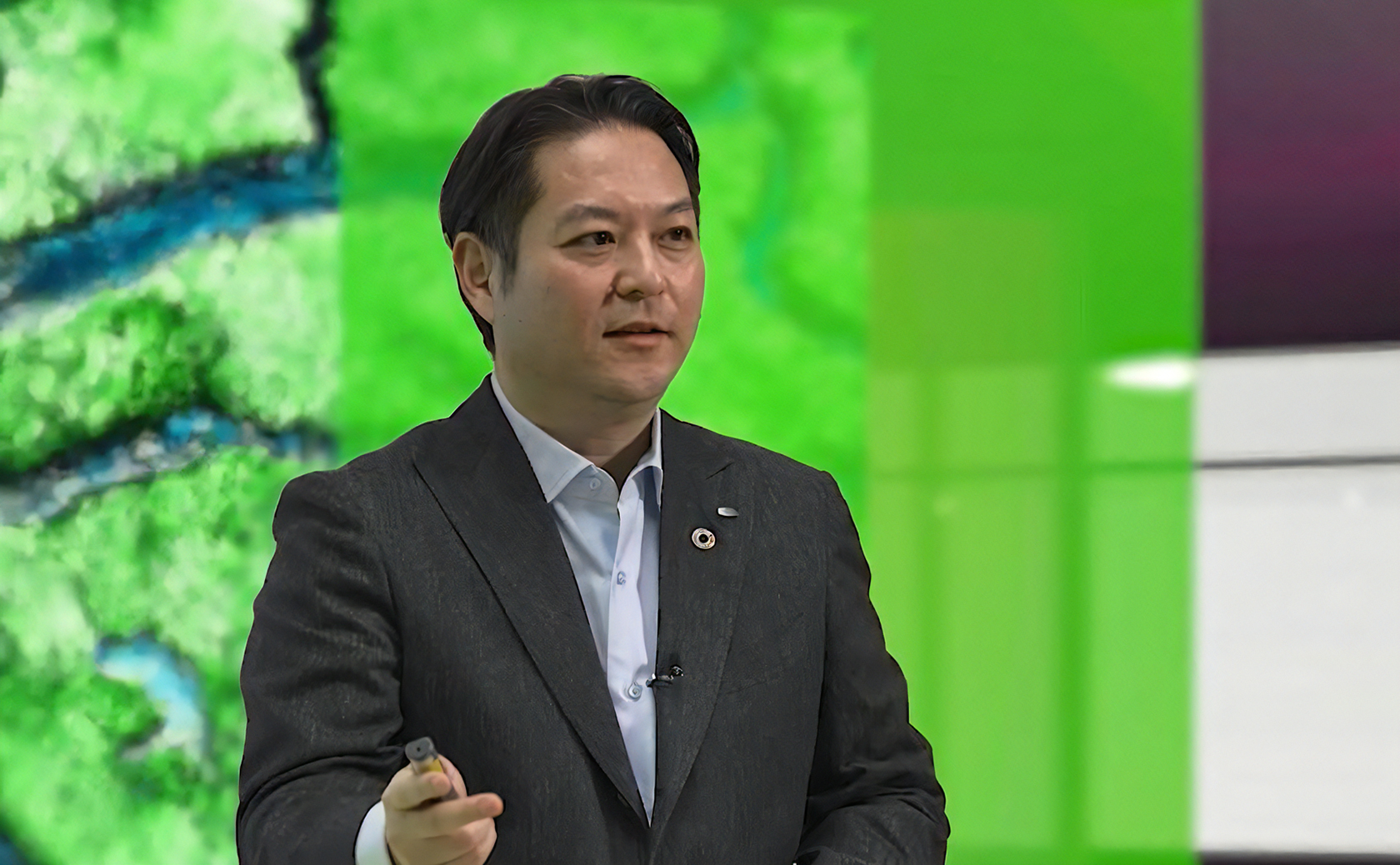Embracing the future of hybrid working
Fujitsu / March 31, 2022
This guest blog from Professor Lynda Gratton explores the trends and challenges organizations face as they move into the new world of hybrid working. Based on research conducted by HSM Advisory in collaboration with Fujitsu, Professor Gratton’s expert insights will help business leaders achieve sustainable high performance in a transformed workplace.
The way we work has changed dramatically
We have experienced one of the biggest transformations to our ways of working in decades. The Covid-19 pandemic created an imperative for rapid change, but as we enter into a post-pandemic reality, employees don’t want to go back to the old ways of working. This is creating a real imperative for change as companies struggle to retain and attract talented people.
As we redesign work and shift to a hybrid model, it is imperative that each organisation builds their own story, their own ‘signature.’ Embedding this change into ways of working is key to ensuring the lessons learnt during the pandemic are not forgotten.
That is why I am delighted to be part of this pivotal research in partnership with Fujitsu. Together we have explored what has been learned as companies step into a hybrid way of working. We have also examined what needs to be done now to ensure that companies continue to redesign work in ways that is performance-led and sustainable for individuals, organisations, and society.
We have identified three core elements that underpin a sustainable, high-performance model of work. As leaders embed and build upon the lessons learned, they need to consider each of these elements: what work means; how work is done; and the needs of the people who carry it out.
Through this holistic redesign of work, our hope is that organisations will continue to create their own signature approach and respond effectively to the emergent opportunities and challenges of this new era of work.

The Sustainable High Performance Model
RETHINK what work means
Now more than ever, as employees exercise more freedom over where and when they work, they are seeking a sense of meaning. By building an inclusive culture that considers the needs of employees working from both home and the office, organisations will be able to provide their employees with a distinct sense of belonging regardless of their location.
Through our research we observed the role of the leader in supporting this inclusive culture and how it has evolved. The shift to hybrid working has increased digital skills and made it the norm to use technologies like zoom and teams to communicate. Both more visible and accessible to their people, leaders reported feeling “like youtubers,” providing employees with a virtual connection to their organisational culture, narrative, and values.
Connections become ever more important as employees move from traditional working models to flexible, hybrid ways of working that gives them greater freedom and autonomy over time and place. So, maintaining a sense of connectedness to their teams and the company is a significant challenge. Connecting to a sense of identity becomes ever more crucial. We found that employees wanted to keep a distinct feeling of working at their organisations – even when they worked from home. The challenge is how best to create this sense of belonging and connectedness regardless of where people are located.
For some companies, a “remote-first” approach is one way they are trying to achieve this. They are doing this by ensuring that meetings, socials, and work events are accessible to colleagues both in the office and working from home. Their aspiration is that ‘remote-first’ helps embed a sense of belonging and encourages people to use their flexibility to make decisions about where they work, without running the risk of missing out on opportunities to connect, learn, and progress.
REIMAGINE how work is done
Where and when work is changing, and so how success is measured should also change. For a hybrid model to work, it is crucial that executives trust their employees to succeed from both the home and the office. That means measuring performance based on outputs, rather than past presenteeism norms. To effectively reimagine how work is done, creating new norms will be key to ensuring the changes we make are long-lasting and sustainable.
As we develop these new norms, there is also a renewed interest in energy, and how to manage it. During the pandemic it became very clear the significant impact an individual’s wellbeing has on their ability to work sustainably. That is why it is so important now for leaders to support the wellbeing of their colleagues. They can do this by encouraging open communication, which empowers employees to make their own autonomous decisions about when to replenish their energy. For example, when to work from home or come into the office, and to have some flexibility over their working hours.
We have discovered that one of the real benefits of hybrid working has been the opportunity to access a diversity of knowledge and perspectives. By utilising new, digital channels to support collaborative work across functions and geographies organisations have the opportunity to boost creativity by accessing new ideas. But we know that innovation is complex.
For whilst hybrid working has opened up opportunities to incorporate a global perspective into the processes of innovation, it comes with challenges. For example, there are real benefits of working in a shared, physical space: there is a physicality of face-to-face cooperation and innovation. Bringing people into a shared, physical space encourages them to create those trusting human connection that can be crucial to overcoming complex challenges.
So as executives and their companies reimagine how work is done, striking a balance about the value of physical and virtual spaces will be crucial. It is this balance that will be a core component to designing a hybrid model that is performance-led and sustainable.
EMPOWER employees and their managers
As employees have moved to hybrid working many have re-assessed what is important to them, and for some organisations this has led to a growing concern about the “Great Resignation” – an age of mass turnover. Employees are more likely to stay and flourish if they are empowered to make autonomous decisions about when and where they work and have empathic and supportive relationship with their managers.
Indeed, the experience of the pandemic has highlighted the key role of managers – who have often times created both frequent and impactful moments of connection with employees. As organisations move to hybrid working, managers will be essential to connecting people and creating a positive experience of work.
But this empathy, sense of connection and belonging can be tough as managers face many other expectations. Their roles are expanding to encompass the management of project tasks and work schedules, alongside the ever-crucial people experience. Their role has become more complex as teams have moved from static, fixed-place, time-synchronous ways of working, to work that is more fluid. They are also faced with the task of managing work that is flexible with regard to both time and place.
That’s why supporting managers through this change is essential. That means empowering managers to safeguard time to support and coach their team members. It also means incorporating both technical and human skills into the managerial skills agenda.
Closing Thoughts
Reflecting on Fujitsu and HSM’s partnership in creating the Embracing the future of hybrid working report, I am inspired by the many ways employees, leaders, and whole organisations have worked together to ensure we don’t lose this once-in-a-lifetime opportunity to truly redesign work for the better.
As we move to these new ways of working, we will need to continue to think about three core elements of work:
1. RETHINK what work means.
Ensure culture and purpose provide a sense of meaning and belonging in work. Think about how technology can be used to help people engage with their teams and wider organisations, regardless of where they are working from.
2. REIMAGINE how work is done.
Embed an output-focussed view of performance and enable innovation in both virtual and in-person environments. Encourage a flexible approach to time and place, away from old presenteeism norms. Additionally, share experiments, successes, and failures widely to demonstrate the importance of innovation as we continue to redesign our ways of working.
3. EMPOWER employees and their managers.
Consider the skills managers will need to manage effectively across the axes of place and time; ensuring they have the support to develop both their technical and human skills. Encourage employee autonomy so people can balance their working preferences with the requirements of the task at hand.

Lynda has written extensively about the interface between people and organizations. Her books cover the link between business and HR strategy (Living Strategy), the new ways of working (The Democratic Enterprise), the rise of complex collaboration (Hot Spots and Glow) the impact of a changing world on employment and work (The Shift ) and the impact of longevity on society (The 100 Year Life – co-authored with Andrew Scott). In 2012 The Shift received the best book of the year in Japan and has been translated into more than 15 languages. In 2015 The Key won the CMI Management Book of the Year. In 2017 The 100 Year Life was shortlisted for the FT Business Book of the Year, became a best-selling book in Japan and has been translated into 15 languages.
Lynda’s work has been acknowledged globally – she has won the Tata prize in India; in the US she has been named as the annual Fellow of NAHR and won the CCL prize; whilst in Australia she has won the HR prize. She has been named by Thinkers 50 has one of the top 15 thinkers in the world.
Lynda is a Steward of the World Economic Forum and has chaired the WEF Council on Leadership. She serves as a judge on the Google.org prize, and in November 2017 was named as a council member of Prime Minister Abe’s council on social change.
Editor's Picks






